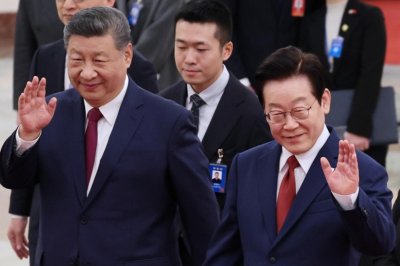South Korea struggles to navigate delicate position between U.S., China

South Korean President Lee Jae Myung (R) and Chinese President Xi Jinping wave to children as they attend a welcome ceremony for the South Korean leader before their summit talks at the Great Hall of the People in Beijing on Monday. Photo by YONHAP/ EPA
SEOUL, Jan. 9 (UPI) — South Korean President Lee Jae Myung flew to China this week for a summit with his Chinese counterpart, Xi Jinping, for the second time in two months. Lee is the first president of the country to visit Beijing since 2019.
Lee said that the two leaders should meet at least once a year, stressing the significance of shoring up the bilateral relationship between the two neighbors, whose ties at times have been strained.
Observers point out that Lee’s meetings with Xi showcases Seoul’s delicate position amid the intensifying rivalry between the United States and China.
“Despite its security alignment with Washington, South Korea relies heavily on China for trade, although the dependence has declined somewhat in recent years. As a result, Seoul is in a delicate position,” Myungji University political science professor Shin Yul told UPI.
“In the past, there was a simple formula — the U.S. for security and China for trade. But at a time when the world’s two most powerful countries are at odds and conditions are changing so fast, such an approach may no longer work,” he said.
Relations between Seoul and Beijing became worse in 2016 and 2017, when South Korea cooperated with the United States to deploy the Terminal High Altitude Area Defense, or THAAD, missile defense system to tackle North Korea’s threats.
However, the decision provoked China, which feared the advanced radar system would provide a window into the communist country’s internal airspace.
Beijing eventually initiated with what Seoul described as unofficial economic retaliation, including restrictions on Korean cultural content, group tourism bans and regulatory pressure on Korean businesses operating in China.
Officially, however, Beijing has consistently denied taking retaliatory measures over the past decade. Against this backdrop, Lee expressed hope to deal with them during a meeting Tuesday with Chen Jining, Communist Party secretary of Shanghai.
“Korea-China relations will advance to an entirely new stage through this visit to China,” Lee said. “I believe this trip will serve as a valuable opportunity to resolve the minor frictions that existed in the past.”
Strategic ambiguity
Improved ties with China would offer short-term economic benefits for South Korea, as China is South Korea’s largest trading partner. Last year, South Korea’s exports to China totaled $130.81 billion, compared with $122.87 billion to the United States.
However, analysts caution that Seoul cannot prioritize relations with Beijing in isolation, as Beijing’s rivalry with the United States directly affects its core security alliance.
“We cannot closely collaborate with China in such sensitive industries as semiconductors and nuclear reactors,” economic commentator Kim Kyeong-joon, formerly vice chairman at Deloitte Consulting Korea, said in a phone interview.
“In addition, China is our competitor in many industries, including steel, automobiles, rechargeable batteries and petrochemicals. There have also been recurring conflicts over intellectual property issues between the two,” he added.
Concerns have grown among Korean corporations over technology leakage and imitation by their Chinese competitors, particularly in such high-tech sectors as semiconductors and displays.
In this climate, South Korea has little choice but to carefully balance its approach, said political commentator Choi Soo-young, who worked at the presidential house in the 2010s.
“We should shun a situation in which we are forced to single-handedly side with one of the two superpowers, the United States and China. That would be the worst-case scenario,” Choi said.
“In other words, we are required to maintain the so-called ‘strategic ambiguity.’ However, it is a tall task to achieve, as amply demonstrated by Japan’s case,” he said.
From the perspective of Seoul, strategic ambiguity refers to avoiding explicit alignment choices at a time when Washington and China have competing strategic interests, according to Choi.
China’s relationship with Japan has frayed in recent months amid geopolitical tensions, leading to economic standoffs with direct trade impacts.
For example, China imposed export restrictions on dual-use goods this month, targeting Japan. It also curbed exports of rare earth elements, which are vital to Japan’s electronics and automotive supply chains.
Meanwhile, the Seoul administration announced Friday that Lee is scheduled to visit Japan early next week for a summit with Japanese Prime Minister Sanae Takaichi.
